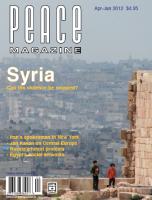
Peace Magazine Apr-Jun 2012, page 5. Some rights reserved.
Search for other articles by peacemag here
Might I add to Karin Brothers’ excellent letter in your latest issue?
The London Review of Books November 2011 issue has a very well-informed 19-page article about the Libyan situation written by Hugh Roberts.
Roberts was previously director of the International Crisis Group and is about to take up a professorship in Middle Eastern history at Tufts University.
Says he: “the Libyan drama is…an addition to the list of Western or Western-backed wars against hostile, ‘defiant,’ insufficiently ‘compliant,’ or ‘rogue’ regimes.”
He also shows in detail that the story, launched by al-Jazeera, which hit the headlines on 21 February 2011 about Gadhafi using his air force to slaughter civilians, was without any basis in fact. Yet UN Resolution 1970 was built on that piece of propaganda.
Here in the UK it was generally assumed, as usual, that once the Security Council has passed a resolution there is no room for further argument. Nothing could be further from the truth. Article 42 of the UN Charter only gives the Security Council the right to authorize military action when all nonviolent peaceful methods of resolving a conflict, some of which are listed in Article 41, “would be or have proved to be inadequate…” In the Libyan situation a range of nonviolent options, which Roberts lists, were simply ignored.
In national law, there are ways of taking law-making bodies to court if they make decisions which are beyond their powers. So it should also be in international law. Such determination of legitimacy, even of Security Council resolutions, ought to be a normal function of the International Court of Justice.
Bruce Kent
Movement for the Abolition of War, London, UK
Speaking in Toronto in February, UK lawyer Polly Higgins noted that there is no recourse for crimes against the earth. She is campaigning to enable appeals to the UN. See the website http://www.ecosanity.org or contact me.
Lyn Adamson, Toronto, ON lyn.adamson9@gmail.com
Vaclav Havel was one of the greatest moral leaders of our time. Spending a few minutes in his company is one of the highlights of my life. I am inspired by his thought and uncompromising intellectual and moral integrity.
Following Vaclav Havel, we can imagine human identity or the idea of home as a series of concentric circles with the self, the “I,“at the center. The different circles, the different aspects of what I experience as home, include my family and friends, my work, my community, my culture, language and history, my citizenship —with both rights and responsibilities, my nationality, my planet, and my membership in the human species. All the aspects of who I am are important and legitimate. All must be respected and given their due. When xenophobia reigns supreme, identification with a nation or a race comes to overwhelm all the others, upsetting the balance and damaging people and society. In fighting it, we must reinvent ourselves and become respectful of different kinds of belonging.
Andrew Pakula, Toronto, ON

Peace Magazine Apr-Jun 2012, page 5. Some rights reserved.
Search for other articles by peacemag here